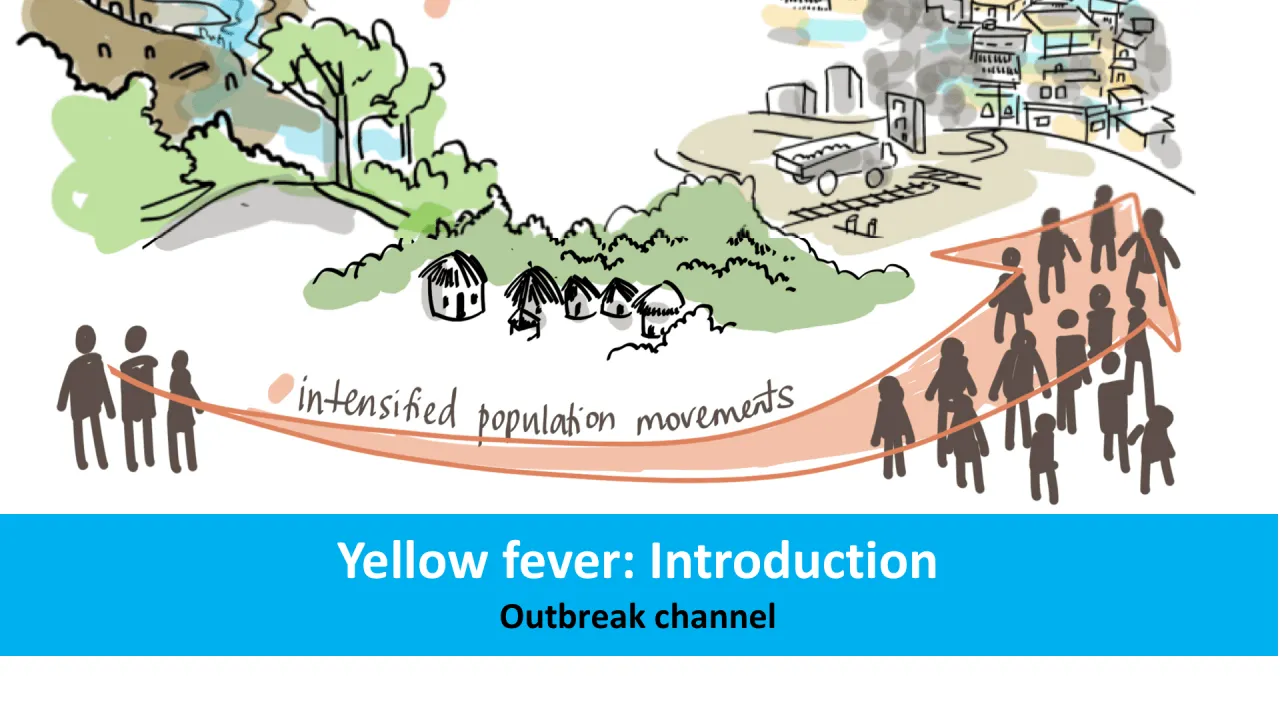
Yellow fever: Introduction (English&Kanuri) 
Discover the fundamentals of Yellow fever: Introduction (English/Kanuri) ▼
ADVERTISEMENT
Course Feature
![]() Cost:
Cost:
Free
![]() Provider:
Provider:
OpenWHO
![]() Certificate:
Certificate:
Free Certification
![]() Language:
Language:
English
![]() Start Date:
Start Date:
On-Demand
Course Overview
❗The content presented here is sourced directly from OpenWHO platform. For comprehensive course details, including enrollment information, simply click on the 'Go to class' link on our website.
Updated in [May 19th, 2023]
This course provides an introduction to yellow fever for personnel responding to outbreaks in complex emergencies or in settings where the basic environmental infrastructures have been damaged or destroyed. It covers topics such as the epidemiology, transmission, clinical features, diagnosis, treatment, and prevention of yellow fever. The course is available in both English and Kanuri, and includes materials that can be accessed online. It was developed in 2018, and for the latest updates, users are encouraged to refer to the relevant health topics on the WHO website.
[Applications]
After completing this course, participants should be able to:
• Describe the epidemiology, clinical features, diagnosis, and management of yellow fever
• Identate the risk factors for yellow fever transmission
• Explain the principles of yellow fever prevention and control
• Describe the role of the health sector in responding to yellow fever outbreaks
• Identify the resources available for responding to yellow fever outbreaks
It is suggested that participants apply the knowledge gained from this course by responding to yellow fever outbreaks in complex emergency or disaster settings. They should also be able to identify the resources available for responding to yellow fever outbreaks and use them to develop and implement effective prevention and control strategies.
[Career Paths]
1. Public Health Officer: Public health officers are responsible for monitoring and controlling the spread of infectious diseases, such as yellow fever. They work with local, state, and federal governments to develop and implement public health policies and programs. They also provide education and outreach to the public about the importance of preventive measures, such as vaccination.
2. Epidemiologist: Epidemiologists are scientists who study the patterns, causes, and effects of diseases in populations. They use data from surveillance systems to identify risk factors and develop strategies to prevent and control the spread of yellow fever.
3. Infectious Disease Physician: Infectious disease physicians specialize in the diagnosis and treatment of infectious diseases, such as yellow fever. They work in hospitals, clinics, and other healthcare settings to provide care to patients with infectious diseases.
4. Vector Control Specialist: Vector control specialists are responsible for controlling the spread of infectious diseases by controlling the populations of disease-carrying insects, such as mosquitoes. They use a variety of methods, such as insecticide spraying, to reduce the number of vectors in an area and reduce the risk of disease transmission.
[Education Paths]
1. Bachelor of Science in Public Health: A Bachelor of Science in Public Health (BSPH) degree is designed to provide students with a comprehensive understanding of public health principles and practices. This degree program typically includes courses in epidemiology, biostatistics, environmental health, health policy, and health services administration. Students will also gain an understanding of the social, economic, and political factors that influence public health. This degree is ideal for those interested in pursuing a career in public health, health policy, or health services administration.
2. Master of Public Health: A Master of Public Health (MPH) degree is designed to provide students with advanced knowledge and skills in public health. This degree program typically includes courses in epidemiology, biostatistics, environmental health, health policy, and health services administration. Students will also gain an understanding of the social, economic, and political factors that influence public health. This degree is ideal for those interested in pursuing a career in public health, health policy, or health services administration.
3. Doctor of Public Health: A Doctor of Public Health (DrPH) degree is designed to provide students with the highest level of knowledge and skills in public health. This degree program typically includes courses in epidemiology, biostatistics, environmental health, health policy, and health services administration. Students will also gain an understanding of the social, economic, and political factors that influence public health. This degree is ideal for those interested in pursuing a career in public health, health policy, or health services administration.
4. Master of Science in Global Health: A Master of Science in Global Health (MSGH) degree is designed to provide students with an understanding of global health issues and the strategies used to address them. This degree program typically includes courses in epidemiology, biostatistics, environmental health, health policy, and health services administration. Students will also gain an understanding of the social, economic, and political factors that influence global health. This degree is ideal for those interested in pursuing a career in global health, health policy, or health services administration.
Course Provider

Provider OpenWHO's Stats at AZClass
Discussion and Reviews
0.0 (Based on 0 reviews)
Explore Similar Online Courses

Blender Basics

Visual Design Foundations Course

Python for Informatics: Exploring Information

Social Network Analysis

Introduction to Systematic Review and Meta-Analysis

The Analytics Edge

DCO042 - Python For Informatics

Causal Diagrams: Draw Your Assumptions Before Your Conclusions

Whole genome sequencing of bacterial genomes - tools and applications

Six Sigma

Six Sigma Training & Methodology


Start your review of Yellow fever: Introduction (English&Kanuri)